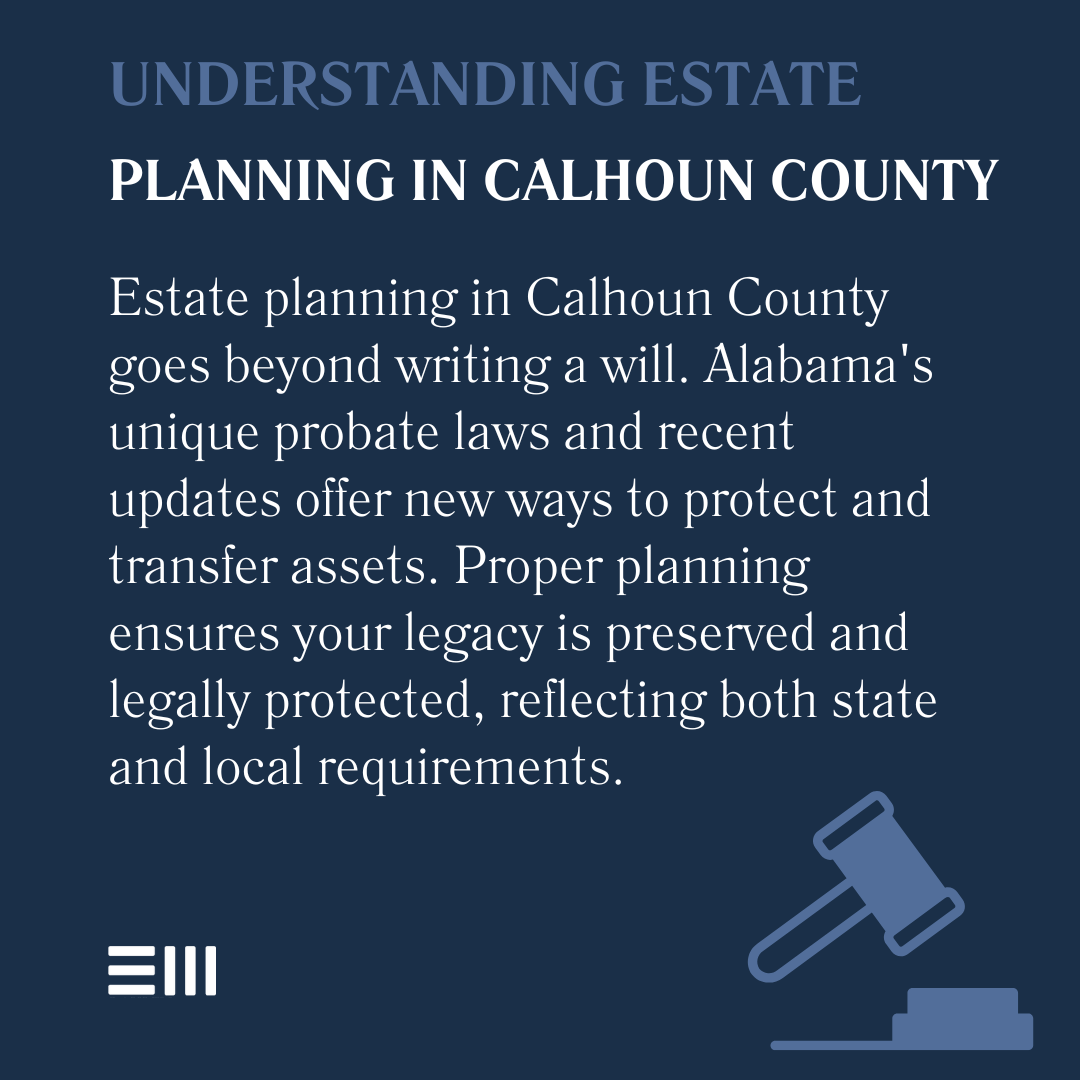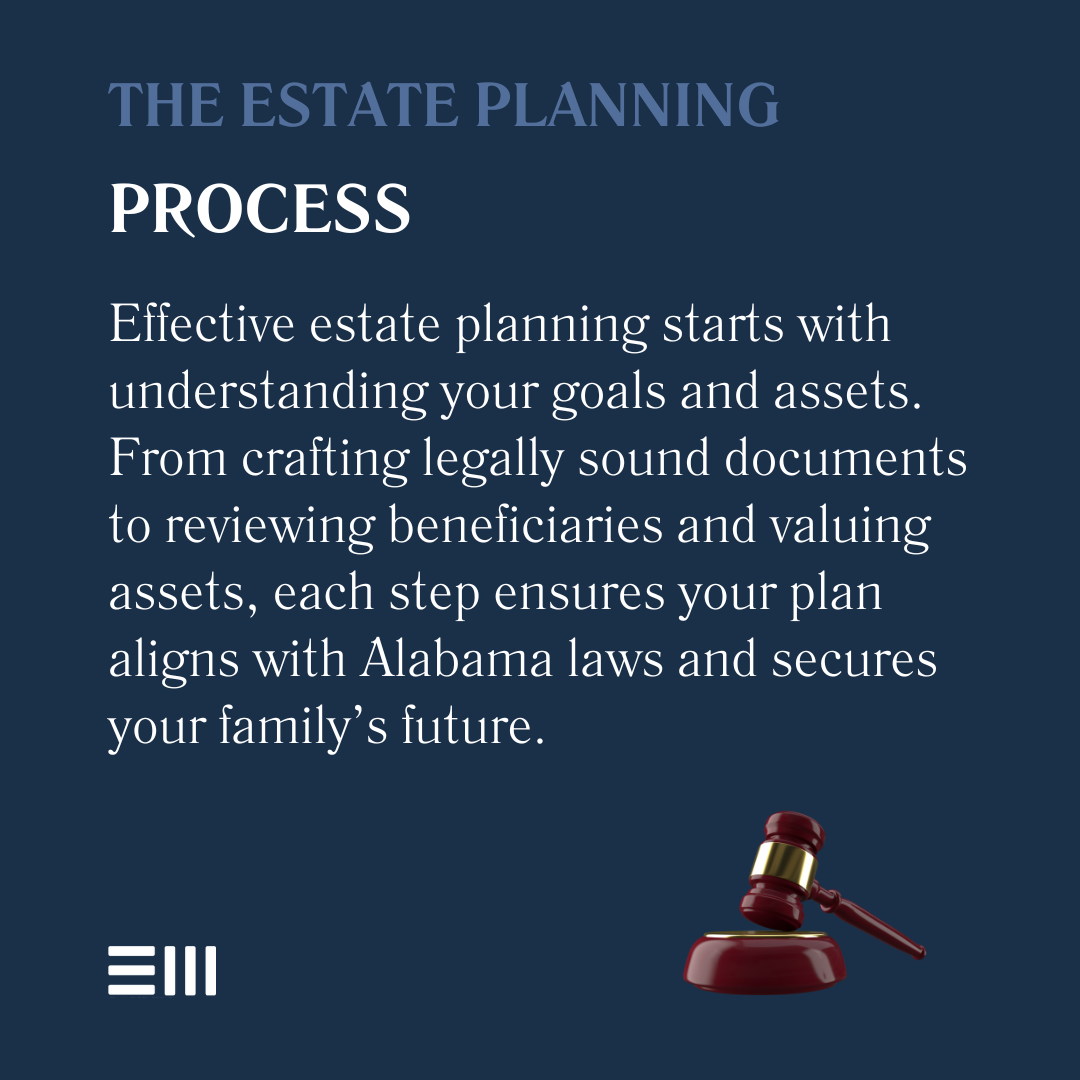Every family story in Calhoun County holds generations of memories, hard work, and carefully built legacies.
Behind the historic homes of Anniston, the family businesses in Oxford, and the cherished properties passed down through Jacksonville families lies the need to protect what matters most.
While many focus on building their legacy, fewer take the essential steps to protect it. Estate planning transforms your wishes for your family's future from hopes into legally binding guarantees, ensuring your life's work continues to support and protect your loved ones exactly as you envision.
Understanding Estate Planning in Calhoun County, AL
Estate planning in Calhoun County encompasses more than just writing a will. Local regulations and Alabama state laws interact to create unique considerations for residents.
Recent changes to Alabama's probate laws have expanded the options available for protecting and transferring assets, making professional guidance more valuable than ever.
Our local courts have specific requirements for estate documentation and administration. Understanding these requirements ensures your estate plan will stand up to legal scrutiny and effectively serve its intended purpose.
From simple wills to complex trusts, each element must align with both state and local regulations.
Essential Estate Planning Services
Estate planning services in Calhoun County address various aspects of asset protection and wealth transfer.
Before diving into specific services, it's important to understand that each estate plan should be tailored to individual circumstances and goals.
- Last Will and Testament Creation: A properly executed will serves as the foundation of most estate plans. Alabama law requires specific formalities for a will to be valid, including proper witnessing and notarization procedures unique to our state.
- Trust Formation and Management: Trusts offer flexibility in asset distribution and can help avoid probate. Options include revocable living trusts, special needs trusts, and charitable trusts, each serving different purposes in estate preservation.
- Power of Attorney Designation: Medical and financial powers of attorney ensure your wishes are carried out if you become incapacitated. These documents must comply with Alabama's specific requirements to be effective.
- Healthcare Directives: Advanced directives and living wills specify your medical care preferences, providing crucial guidance to family members and healthcare providers during difficult times.
- Asset Protection Strategies: Implementing methods to shield your assets from creditors and minimize estate tax implications while ensuring smooth transfer to beneficiaries.
Estate planning services work together to create a comprehensive strategy for protecting your legacy and ensuring your wishes are honored.
The Estate Planning Process in Calhoun County, AL
Understanding the estate planning process helps clients feel more confident about taking this important step.
Each phase builds upon the previous one to create a comprehensive plan.
- Initial Consultation: A thorough review of your assets, family situation, and goals helps determine the most appropriate estate planning strategies.
- Document Preparation: Creation of legally sound documents that reflect your wishes and comply with Alabama state law and local requirements.
- Asset Inventory and Valuation: Detailed documentation of all assets, including real estate, investments, business interests, and personal property.
- Beneficiary Designation Review: Ensuring all insurance policies, retirement accounts, and other assets have properly designated beneficiaries.
- Regular Plan Review: Periodic updates to reflect changes in your life circumstances, asset portfolio, or applicable laws.
The process concludes with a final review and proper execution of all documents, ensuring every aspect of your estate plan is legally binding and effectively serves its intended purpose.
Common Estate Planning Concerns
Before addressing specific questions, it's important to recognize that estate planning concerns often reflect deeply personal matters about family, legacy, and financial security.
Understanding these common issues helps in creating more effective solutions.
- Probate Avoidance: Strategies to minimize court intervention and reduce the time and cost of asset distribution.
- Business Succession: Ensuring smooth transition of family businesses through proper planning and documentation.
- Blended Family Considerations: Addressing the unique challenges of providing for current spouses and children from previous marriages.
- Tax Implications: Understanding and planning for estate, gift, and income tax consequences of various estate planning strategies.
- Special Needs Planning: Creating provisions for family members with disabilities while preserving their eligibility for government benefits.
These concerns require careful consideration and often benefit from professional guidance to develop appropriate solutions.
Frequently Asked Questions About Estate Planning in Calhoun County, AL
Estate planning in Calhoun County, AL naturally raises many questions, and having clear answers helps you make informed decisions about your future.
Here are responses to common queries from Calhoun County residents.
What Are the Basic Requirements for a Valid Will in Alabama?
For a will to be valid in Alabama, the testator must be at least 18 years old and of sound mind.
The will must be in writing, signed by the testator, and witnessed by at least two people who also sign the document. While notarization isn't required, it can make the probate process smoother.
How Often Should I Update My Estate Plan?
Major life events such as marriage, divorce, births, deaths, or significant changes in assets should trigger a review of your estate plan.
Even without major changes, reviewing your plan every 3-5 years ensures it remains aligned with your wishes and current law.
What Happens if I Die Without a Will in Calhoun County?
Alabama's intestacy laws determine how your assets are distributed if you die without a will.
These laws may not align with your wishes, potentially leading to unintended beneficiaries and complicated probate proceedings.
Can I Create My Own Estate Plan Without an Attorney?
While self-help estate planning documents are available, they may not account for complex family situations, business interests, or specific Alabama legal requirements.
Professional guidance helps ensure your plan is comprehensive and legally sound.
How Can I Minimize Estate Taxes?
Various strategies, including trusts, gifting programs, and proper asset titling, can help reduce potential estate tax liability. The appropriate approach depends on your specific financial situation and goals.
Secure Your Legacy Today
Your estate plan represents more than just legal documents—it's your legacy and your family's future security.
Whether you're starting from scratch or updating an existing plan, taking action now ensures your wishes will be honored and your loved ones protected.
Contact us to schedule a confidential consultation about your estate planning needs. Our experienced team will guide you through creating a comprehensive plan that provides peace of mind for you and your family.


